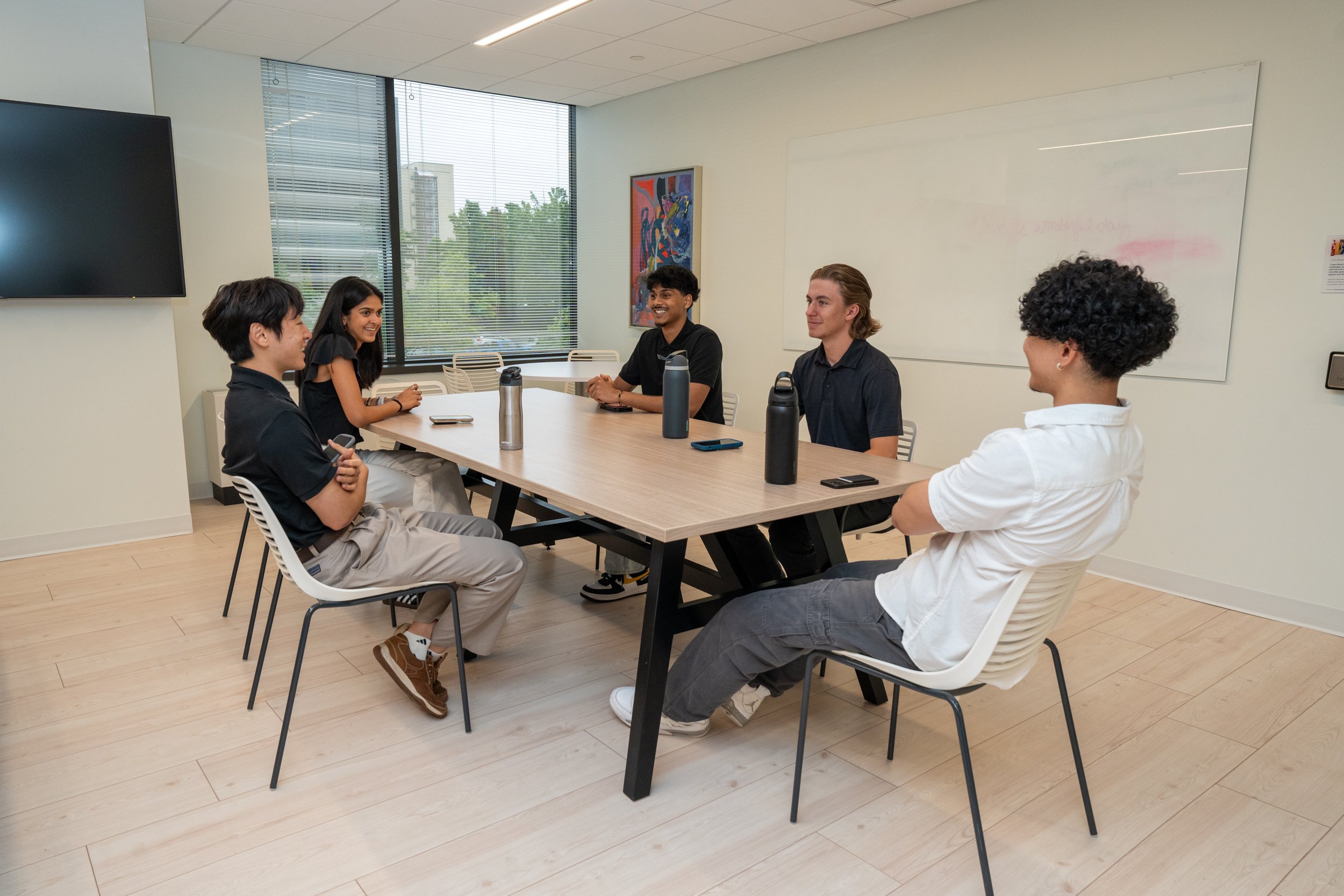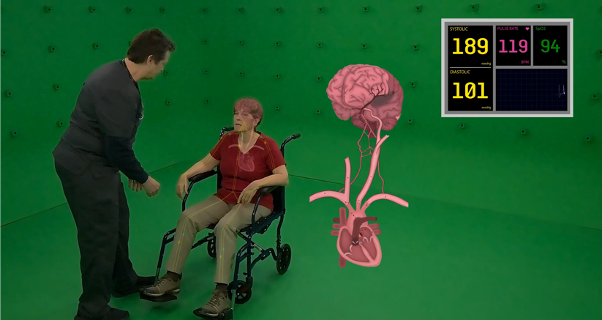Inaugural Cohort of UM-IHC Summer Interns Develops Immersive Experiences to Train the Next Generation of Physicians
This summer, the University of Maryland Institute for Health Computing (UM-IHC) welcomed its inaugural cohort of 17 student interns, marking a significant step in its mission to revolutionize health care through high-performance computing and artificial intelligence (AI).
Located in North Bethesda, UM-IHC was founded in 2022 with a bold vision: to improve well-being and quality of life, diminish disease, and enhance health outcomes for all citizens of Maryland and beyond. Achieving this vision includes transforming the way future health care professionals are trained.
With the rise of digital health tools and AI, UM-IHC saw an opportunity to create immersive training experiences that better prepare medical students for real-world scenarios.
UM-IHC Interns Delve into Big Data
The internship program at UM-IHC included 11 interns engaged in a variety of research projects. Eight worked on data projects looking at the social determinants of health under the guidance of Rozalina McCoy, M.D., M.S., director of UM-IHC’s Precision Medicine and Population Health Program and associate professor of medicine at the University of Maryland School of Medicine (UMSOM). Two interns worked under Katarina Zeder, M.D., Ph.D., a postdoctoral fellow at UMSOM and UM-IHC, using epidemiological data to assess lung diseases, and one intern worked under Pratyush Tiwary, Ph.D., a professor of chemistry and biochemistry at the University of Maryland, College Park (UMCP) and UM-IHC.
The interns included:
Abby Abaku, a junior double major in public health science and psychology at UMCP, examined the association between historical redlining, area deprivation, and other structural factors and quality of skilled nursing facilities.
Lola Akintoye, a public health science and psychology double major at UMCP, studied the association between hospital power and the services hospitals provide as well as the ability to address social determinants of health and caring for underserved communities.
Sinan Aktay, a first-year medical student at UMSOM, worked on docking molecules to Endothelin B receptor, a protein implicated in hypertension.
Elisha Barrientos, a UMSOM student, conducted a qualitative study examining the impact of comprehensive primary care on the quality and equity of diabetes management and outcomes.
Se Chun, a public health science major at UMCP, assisted on building a data infrastructure to study multi-level social determinants of health across Maryland.
Grace Huang, a biochemistry major at UMCP, conducted three qualitative studies seeking to understand the drivers of severe hypoglycemia and hyperglycemia among adults with diabetes.
Davi Jacobs, an economics major at UMCP, conducted a qualitative study examining the reasons why people with diabetes decline clinical interventions to prevent severe hypoglycemic events.
Urja Kalathiya, a UMSOM student, conducted a qualitative study examining the impact of comprehensive primary care on the quality and equity of diabetes management and outcomes.
Vera Ngah worked on assessing the global prevalence of pulmonary hypertension focusing on the sub-Saharan Africa region.
Armella Santi, a fourth-year medical student at UMSOM, worked on investigating the prevalence of pulmonary hypertension in lung diseases, especially highly frequent diseases such as chronic obstructive pulmonary disease (COPD), that play an important role in global disease burden.
Stacey Sklepinski, a UMSOM student, examined the comparative effectiveness and safety of diabetes medications on type 1 diabetes and sexual health.
Six interns in this first cohort directly contributed to that effort by developing new digital models that simulate medical conditions and doctor-patient interactions, offering a more hands-on learning experience for medical students. An additional 11 interns worked on other research projects involving increasing efficiencies in the use of epidemiological data, using AI for protein structure modeling and using qualitative data to study multi-level social determinants of health (see sidebar UM-IHC Interns Delve into Big Data.)
“This was a very exciting milestone for the University of Maryland Institute for Health Computing because we were able to welcome a group of summer students and trainees to our program for the first time,” said Bradley Maron, co-executive director of UM-IHC and a professor of medicine at the University of Maryland School of Medicine. “Educating the next generation of computer scientists and data researchers in health and human disease is a major priority for the institute, and the work advanced by this inaugural group of summer interns was exciting, impressive and highly impactful. Indeed, this group set a fantastic example for summer interns at IHC for years to come.”
A Diverse and Driven Cohort
The summer interns came from a range of institutions and backgrounds, bringing unique perspectives while sharing a passion for making a meaningful impact in the health sciences.
The group included:
Everett Hontz, senior at North County High School in Ferndale, Maryland
Raama Katragadda, computer science major at Michigan State University
Mira Khera, film and TV major at New York University
Arya Palan, computer science major at the University of Maryland, College Park (UMCP)
Konchok Shonu, computer science major at UMCP
Marvin Xu, computer science major at UMCP
For most of the interns, this was their first research experience and their first experience working in the medical field.
Khera, who helped create immersive medical animations to illustrate what happens to a patient’s body during a cardioembolic stroke, noted, “I was a bit nervous because I didn’t have a medical background coming in, and there was definitely a learning curve at first. As I started diving in, though, I became more and more excited by what I was developing. I’m a visual learner myself, so creating these materials that could make medical education more engaging and impactful was such a rewarding experience.”
Innovative Digital Models for Immersive Medical Training
The interns’ projects spanned different aspects of digital medicine, from coding and machine learning to image generation.
In his project, Xu investigated whether certain biomarkers could be used to predict “cybersickness”—the virtual reality (VR) equivalent of motion sickness.
“Many people experience cybersickness after using a VR headset for only 15 minutes, which is a big problem when you want to use VR for training purposes,” he said. “By pinpointing symptoms that correlate to cybersickness, such as heart rate changes, we can develop solutions to make VR more accessible in medical settings.”
By the end of the summer, Xu developed an AI model that could more efficiently analyze biomarker data to find these potential correlations.
Palan researched video segmentation algorithms across diverse settings and light conditions, which is similarly important for building immersive models for training or informational purposes.
“AI detection programs are powerful, but they sometimes have issues tracking objects when they’re obstructed, change colors, or change shapes,” he said. “This is an issue for materials such as surgical training videos, where the viewer would want to track different tools being used. I always wanted to do research focusing on real-life computer science applications, and the IHC has been the perfect place to get that experience. It taught me that there are a lot of different ways you can use a computer science degree beyond just coding.”
Several of the projects also intersected—Shonu, Katragadda, Hontz, and Khera worked on creating an immersive VR training model of a doctor talking to a wheelchair-bound stroke patient based on footage taken in the Holocamera Studio at the University of Maryland, College Park. The interns gained clinical expertise for the project from collaborator Cheri Hendrix, assistant dean of physician assistant education at the University of Maryland, Baltimore.
Shonu and Katragadda worked on modeling the people in the scene and the environment, Khera worked on medical animations that overlaid the model, and Hontz worked on optimizing the audio.
“My part of the project focused on using neurorendering to create and model the humans in this scene,” Shonu said. “I got exposed to many different tools that I hadn’t used much before, such as Linux and GitHub. Because this is such as new field, I also gained a lot of experience with troubleshooting and problem solving.”
Hontz added, “From the audio side of the project, I spent a lot of time figuring out how to effectively reduce noise while maintaining the quality of the audio. I got the chance to learn how to use Adobe Audition in addition to finding tools that could help.”
Mentorship and Professional Development
Beyond their day-to-day research, the interns also benefited from robust mentorship and professional development opportunities. Mentors provided guidance and support, helping the interns navigate the challenges of their projects while offering insights into the broader field of health computing.
“It was so exciting to mentor the interns on their projects, which all make possible amazing transformative advances in health computing that we could have scarcely imagined just a few years ago,” said Amitabh Varshney, a professor of computer science and the dean of the University of Maryland, College Park’s College of Computer, Mathematical, and Natural Sciences.
Varshney served as a faculty mentor along with Sujal Bista, Barbara Brawn, Jon Heagerty, Sida Li and Olivia Mercurio.
Through weekly seminars, interns also had the opportunity to practice their communication skills, learn from their peers and receive valuable feedback to inspire new ideas.
“Besides learning new technical skills, we also learned a lot of soft skills such as how to distill down complex information and create effective presentations,” Xu said.
The interns also built strong camaraderie with each other, often having lunch together and capping the afternoon with fiercely competitive pingpong matches. These moments not only enriched their experience but also reflect the institute’s commitment to teamwork and innovation.
“The summer internship program is crucial to the IHC as we are leveraging the next generation's diverse skill set and also training them to address our research challenges,” said Bista, who served as interim co-executive director of UM-IHC until August 2024 and now directs the institute’s Immersive Visualization Research Center.
A Launchpad for Health Computing Innovators
The inaugural internship program at UM-IHC was more than just a summer experience—it served as a launchpad for the next generation of innovators who will shape the future of health care. As the students head into a new school year, they come equipped with new skills and experiences that will build on their academic work.
“This experience gave me the confidence to try new things outside my comfort zone and not be afraid if I get something wrong,” Khera said. “I also learned so much about how to be organized, multitask and ask the right questions.”
Shonu added, “One of the most important things I learned was that in research, especially an internship, you shouldn’t put too much pressure on yourself to make your end product perfect. There are going to be a lot of challenges and pitfalls, but you learn even more working through those experiences.”
Main article written by Sarah Ellinwood




















